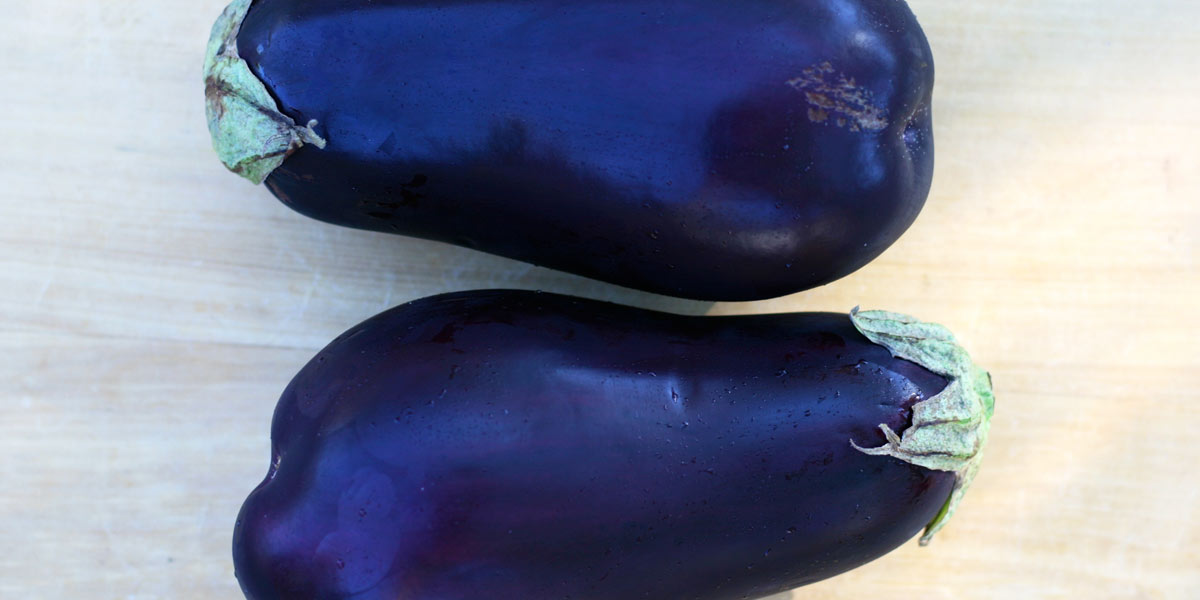Eggplant
Eggplants are a versatile veg commonly used in many delectable Mediterranean, Asian, and Middle Eastern dishes. They range in size, shape, and color and taste amazing in pasta, pizza, sandwiches, hummus, caponata, and baba ghanoush. You can also grill, stew, roast, sauté, pickle or broil eggplant to your heart’s content.
- Eggplants are total brain food! They contain nasunin, a phytonutrient that works as an antioxidant to help protect your cells from free radical damage. In animal studies, nasunin has shown to be very effective in protecting the lipids in brain cell membranes from those nasty free radicals.
- Eggplants also have chlorogenic acid, a phenolic compound that proves to be a very potent free radical scavenger. Its benefits include anti-cancer protection, antimicrobial, antiviral, and anti-LDL cholesterol effects.
- Regular consumption of eggplant proves good for your blood too. Vitamin K ensures proper blood clotting while bioflavonoids strengthen capillaries.
- You’ll also get a dose of fiber, Vitamin B1, and copper in your eggplants too.
Vegukate Tips:
Although EWG does not list eggplants on their Dirty Dozen list; I find that organic tastes far better to their conventional counterparts, who are often glazed with a waxy coat of synthetic chemicals.
Size does matter – at least when it comes to eggplants. Full sized, over puffed eggplants tend to have bitter seeds. Chose an eggplant that is firm, heavy, and smooth without cuts or bruises. Push an eggplant with your thumb to test out ripeness: if a small indentation gives slightly, then bounces back the eggplant is ripe and ready. If no dent forms, the eggplant was picked too early, and if a dent stays permanent, your eggplant has gone mushy.
Keep eggplant in your refrigerator, or in a cool dark place, and use within 2-3 days.
-
Grilled Baba Ghanoush

Simple, smoky grilled baba ghanoush + crunchy Milton’s Gluten Free Crackers + all the simple summer cheese board additions = the best summertime meal! Read the recipe
-
Delicata Squash & Chickpea Curry

Vitamin filled delicata winter squash + hearty eggplant + fiber rich chickpeas + spicy delicious curry flavors + creamy coconut milk + antioxidant lovin’ garlic + bright cilantro = A squash loving curry that will fill you up and warm your bones! Read the recipe (4 comments)
-
Vegetable Abundance Paella

Valencian bomba rice + delicious veggies + smoky paprika + heavenly saffron + bright parsley + salty olives = Your plane ticket to Barcelona and a delicious vegetable Paella! Read the recipe (1 comment)
-
Comforting Eggplant Parmesan

Comfort food doesn't have to be the worst offender in your diet. Create this delicious baked eggplant parmesan with red sauce, melted mozzarella cheese, and fresh basil, pour yourself a glass of red wine, and let the swoon-fest begin. Read the recipe (2 comments)

